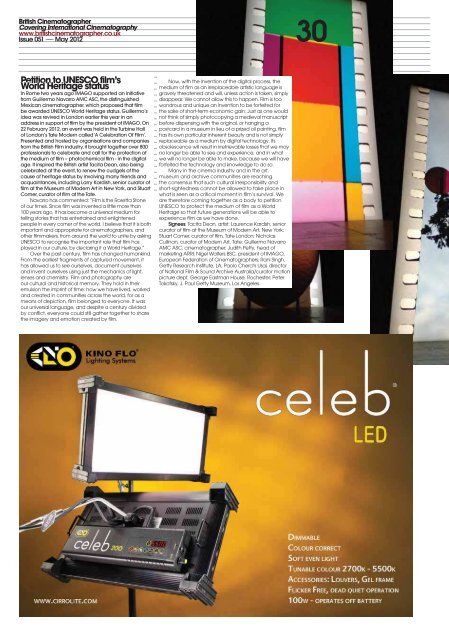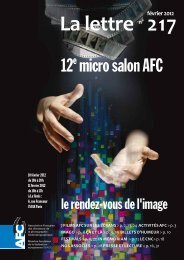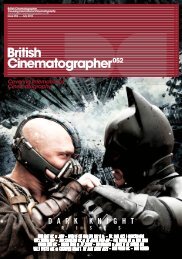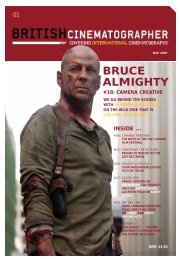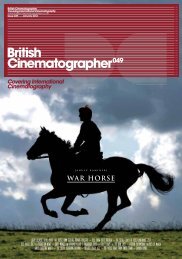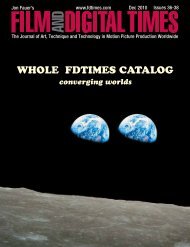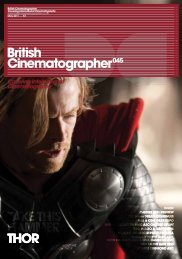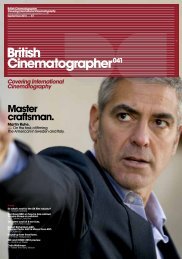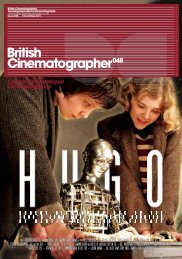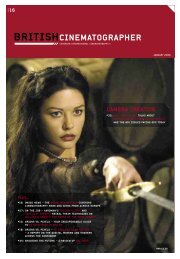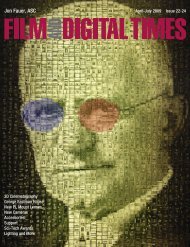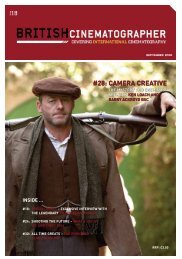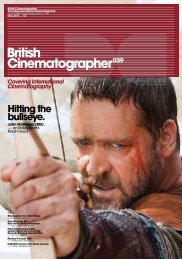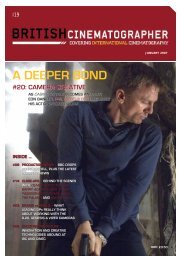British Cinematographer issue 51 - Imago
British Cinematographer issue 51 - Imago
British Cinematographer issue 51 - Imago
You also want an ePaper? Increase the reach of your titles
YUMPU automatically turns print PDFs into web optimized ePapers that Google loves.
<strong>British</strong> <strong>Cinematographer</strong><br />
Covering International Cinematography<br />
www.britishcinematographer.co.uk<br />
Issue 0<strong>51</strong> ––– May 2012 30<br />
Petition to UNESCO film’s<br />
World Heritage status<br />
In Rome two years ago IMAGO supported an initiative<br />
from Guillermo Navarro AMC ASC, the distinguished<br />
Mexican cinematographer, which proposed that film<br />
be awarded UNESCO World Heritage status. Guillermo’s<br />
idea was revived in London earlier this year in an<br />
address in support of film by the president of IMAGO. On<br />
22 February 2012, an event was held in the Turbine Hall<br />
of London’s Tate Modern called ‘A Celebration Of Film’.<br />
Presented and hosted by organisations and companies<br />
from the <strong>British</strong> Film industry, it brought together over 800<br />
professionals to celebrate and call for the protection of<br />
the medium of film – photochemical film - in the digital<br />
age. It inspired the <strong>British</strong> artist Tacita Dean, also being<br />
celebrated at the event, to renew the cudgels of the<br />
cause of heritage status by involving many friends and<br />
acquaintances, including Larry Kardish, senior curator of<br />
film at the Museum of Modern Art in New York, and Stuart<br />
Comer, curator of film at the Tate.<br />
Navarro has commented: “Film is the Rosetta Stone<br />
of our times. Since film was invented a little more than<br />
100 years ago, it has become a universal medium for<br />
telling stories that has entertained and enlightened<br />
people in every corner of the world. I believe that it is both<br />
important and appropriate for cinematographers, and<br />
other filmmakers, from around the world to unite by asking<br />
UNESCO to recognise the important role that film has<br />
played in our culture, by declaring it a World Heritage.”<br />
Over the past century, film has changed humankind.<br />
From the earliest fragments of captured movement, it<br />
has allowed us to see ourselves, document ourselves<br />
and invent ourselves using just the mechanics of light,<br />
lenses and chemistry. Film and photography are<br />
our cultural and historical memory. They hold in their<br />
emulsion the imprint of time: how we have lived, worked<br />
and created in communities across the world, for as a<br />
means of depiction, film belonged to everyone. It was<br />
our universal language, and despite a century divided<br />
by conflict, everyone could still gather together to share<br />
the imagery and emotion created by film.<br />
Now, with the invention of the digital process, the<br />
medium of film as an irreplaceable artistic language is<br />
gravely threatened and will, unless action is taken, simply<br />
disappear. We cannot allow this to happen. Film is too<br />
wondrous and unique an invention to be forfeited for<br />
the sake of short-term economic gain. Just as one would<br />
not think of simply photocopying a medieval manuscript<br />
before dispensing with the original, or hanging a<br />
postcard in a museum in lieu of a prized oil painting, film<br />
has its own particular inherent beauty and is not simply<br />
replaceable as a medium by digital technology. Its<br />
obsolescence will result in irretrievable losses that we may<br />
no longer be able to see and experience, and in what<br />
we will no longer be able to make, because we will have<br />
forfeited the technology and knowledge to do so.<br />
Many in the cinema industry and in the art,<br />
museum and archive communities are reaching<br />
the consensus that such cultural irresponsibility and<br />
short-sightedness cannot be allowed to take place in<br />
what is seen as a critical moment in film’s survival. We<br />
are therefore coming together as a body to petition<br />
UNESCO to protect the medium of film as a World<br />
Heritage so that future generations will be able to<br />
experience film as we have done.<br />
Signees: Tacita Dean, artist: Laurence Kardish, senior<br />
curator of film at the Museum of Modern Art, New York;<br />
Stuart Comer, curator of film, Tate London; Nicholas<br />
Cullinan, curator of Modern Art, Tate; Guillermo Navarro<br />
AMC ASC, cinematographer; Judith Petty, head of<br />
marketing ARRI; Nigel Walters BSC, president of IMAGO,<br />
European Federation of <strong>Cinematographer</strong>s; Rani Singh,<br />
Getty Research Institute, LA; Paolo Cherchi Usai, director<br />
of National Film & Sound Archive Australia/curator motion<br />
picture dept, George Eastman House, Rochester; Peter<br />
Tokofsky, J. Paul Getty Museum, Los Angeles.<br />
31<br />
<strong>British</strong> <strong>Cinematographer</strong><br />
Covering International Cinematography<br />
www.britishcinematographer.co.uk<br />
Issue 0<strong>51</strong> ––– May 2012<br />
Sans frontières<br />
Over the past four years of my service as IMAGO<br />
president, contained in the mail occasionally comes<br />
a phrase or sentence which is poetic and memorable<br />
in its imagery. To the words “Barriers of the Mind” I am<br />
indebted to that great Hungarian cinematographer and<br />
director, Lajos Koltai HSC.<br />
IMAGO helps to break down many barriers of<br />
the minds for many of us; those of prejudice, bigotry,<br />
discrimination, intolerance and injustice to name a few.<br />
It does this by encouraging international understanding<br />
through the brotherhood of a group of individuals<br />
bonded by a love of imagery and cinema. We meet<br />
and talk and enjoy one another’s company, and come<br />
away with a greater understanding of mutual problems.<br />
Our Masterclasses are designed to broaden the minds of<br />
our young cinematographers.<br />
In the privileged role of president it is my duty to<br />
reflect the wishes of our societies. Such an opportunity<br />
has arisen with the welcome formation by twelve<br />
cinematographers of the state of Bosnia and<br />
Herzegovinian of a new society dedicated to improving<br />
standards of their craft in their country.<br />
The Balkans is an area steeped in the history of film.<br />
Every year, in September, IMAGO supports the oldest<br />
festival dedicated to the craft of cinematography –<br />
that of the Manaki Brothers in the small town of Bitula,<br />
Macedonia, a cradle of civilization. The fledging Bosnian<br />
society, the ASBH has not asked for assistance. When<br />
such a request arrives support has been pledged<br />
from the neighbouring societies, including Serbia and<br />
Croatia. IMAGO finds itself in the unique opportunity of<br />
being able to assist the process of bringing our societies<br />
together. Our fellow creative artists have the right to be<br />
regarded everywhere as true colleagues and equals.<br />
The only barriers left to break down in some parts of the<br />
world are those of the mind. Fortunately, these are slowly<br />
crumbling as time heals and tolerance and respect<br />
returns to humanity.<br />
IMAGO congratulates our colleagues in the<br />
ASBH for their determination and fortitude, especially<br />
their president, Mustafa Mustafic. Their colleagues in<br />
Serbia have been actively encouraging this welcome<br />
addition to our fellowship. IMAGO is proposing<br />
that the societies active in that region meet at the<br />
Manaki Festival in Macedonia in September to hold a<br />
Conference of friendship and solidarity to discuss ways<br />
of mutual cooperation.<br />
The Manaki Festival, under its director Labina<br />
Mitevski, has welcomed this initiative and pledged<br />
support for representatives of the societies of all the<br />
countries of the region at a September mini-conference.<br />
The Manaki Festival runs from September 15th to 21st in<br />
Bitula, Macedonia.<br />
If this happens one can also hope that the members<br />
of the society representing Macedonia, the former<br />
republic within Yugoslavia, will exchange news on fertile<br />
soil with delegates from the re-vitalized Greek society.<br />
If this conference could take place, IMAGO would<br />
more than justify its existence. Balkan cinematographers<br />
could resume their proud historical role in the history of<br />
European cinema.<br />
Universal... shots from Tacita<br />
Dean’s installation at Tate<br />
Modern take during the recent<br />
Celebration Of Film event.<br />
Summit special... Michael Goi<br />
ASC brought cinematographers<br />
worldwide together at the ASC<br />
Clubhouse in LA. Photo by<br />
Douglas Kirkland.<br />
In praise of… Michael Goi ASC<br />
In these heady days, when the world is truly too much<br />
with us, and there is hardly time for a well-earned “thank<br />
you”, IMAGO would like to express its appreciation of<br />
Michael Goi, the retiring president of the ASC. A year ago,<br />
thanks to his initiative and guidance, the ASC hosted the<br />
first International Cinematography Summit Conference<br />
in Los Angeles.<br />
This was an important landmark in progressing<br />
International understanding between cinematographers<br />
of his American society and the rest of the world.<br />
Together with his vice-president Richard Crudo ASC, the<br />
ASC has moved forwards to embrace a world anxious<br />
for a closer understanding between cinematographers<br />
everywhere. IMAGO is grateful and wishes Michael well<br />
as he returns to the real world of shooting movies.


